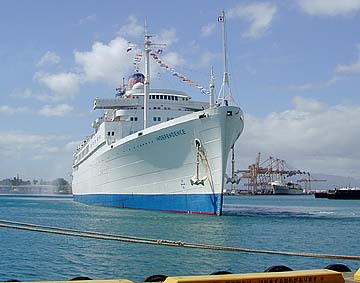


![]()
Talk Story

|
Bush’s budget torpedoes efforts
to salvage cruise shipsEARLY in my career, I was told it was the job of an editorial writer to come down from the hills after the battle and shoot the wounded.
Accordingly, the Wall Street Journal's editorial page was just doing its job Monday when, under the headline "Lotts of Pork," it issued what could be the coup de grace to the remains of "Project America," American Classic Voyages' cruise ship fiasco.
The timing was perfect. When the President's $2.13 trillion budget was delivered to Congress later that same Monday, conspicuously missing was some $250 million in federally guaranteed loans to U.S. shipyards and shipbuilders -- what the Bush budget calls "unnecessary corporate subsidies."
Last month, we learned Congress was urging the Navy to "capitalize on (maritime) loan guarantees" and buy the two unfinished luxury cruise ships. When completed, the idea was to turn them into floating barracks, hospitals or command-and-control centers.
This gambit would have pulled two senators' bacon out of the fire, Minority Leader Trent Lott's and Hawaii Sen. Daniel Inouye's. As it is, critics blame them for already frittering away $367 million in taxpayers' money on loans to build the ships and for giving American Classic a 30-year monopoly on cruise operations in Hawaiian waters.
The ships -- one half built, the other not yet started -- are languishing at Ingalls Shipbuilding, Inc., a Pascagoula, Miss. subsidiary of Northrop Grumman, the No. 1 employer in Lott's home state.
American Classic and its operating subsidiary, American Hawaii Cruises, are now bankrupt. They blame the tourism drought following Sept. 11. Critics also cite poor service and inability to compete with foreign lines.
According to economist John Kenneth Galbraith, "Politics consists of choosing between the disastrous and the unpalatable." President Bush opted for the latter and, despite proposing a 12 percent boost in defense spending, he refused to find room in the budget for the ships.
At the root of this farce is the Passenger Vessel Services Act of 1886, which requires that only U.S.-manufactured, U.S.-flagged, and U.S.-crewed cruise ships carry passengers directly between U.S. ports. Currently, with the demise of American Hawaii Cruises, no ship qualifies under the law as a domestic cruise ship.
"So serious cruise lines buy foreign ships instead," the Journal said in its editorial. They "fly foreign flags, employ foreign crews and make a stopover in a foreign port."
The result? "Over the decades untold thousands of American jobs and untold millions in American revenue have been lost," said the Journal. "And what have protection and subsidies done for U.S. shipbuilding? Well, those two Pascagoula ships would have been the first passenger ships built in the U.S. since 1958."
Appropriately, the champion of common sense in this production has been the senator from land-locked Arizona. John McCain knows something about the Navy, however, having spent a career flying off aircraft carriers. He also knows protectionism and pork.
"I am increasingly concerned that U.S. maritime interests rely too much on government programs that create an environment of dependence and do not foster investment and risk-taking," McCain said in May 2000, "and on government regulations that protect them from real economic competition."
On the other hand, according to the Journal, those who support shipbuilding subsidies maintain that "loyal U.S. citizen crews, secure vessels and secure ports" are essential "as we move forward with our allies in the war against terrorism."
They didn't win the heart of the president, but they did capture his turn of phrase.
"In any rational place the Passenger Vessel Act would have been thrown overboard long ago," the Journal insists. "But we're talking Washington here, where one bad regulation begets another."
The Norwegian Star now offers one-week "Hawaii cruises." Thanks to the PVSA, these include 43 hours at sea en route from Kona to Fanning Island in the Republic of Kiribati, a six-hour stopover and a 48-hour trip back to Nawiliwili on Kauai.
Forget the passengers themselves -- wouldn't Hawaii's tourism industry be better off if the Star spent seven days visiting Hawaiian ports rather than three days here and four days in the South Pacific?
Australian author and TV personality Clive James once wrote, "A luxury liner is just a bad play surrounded by water."
After a 116-year run, it appears the American cruise ship industry is playing to an empty house and it's time to bring the curtain down on the Passenger Vessel Services Act's meaningless port visits for foreign-owned cruise ships.
John Flanagan is the Star-Bulletin's contributing editor.
He can be reached at: jflanagan@starbulletin.com.